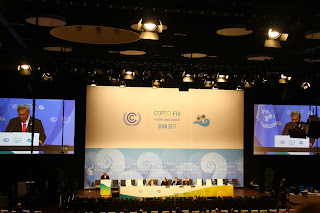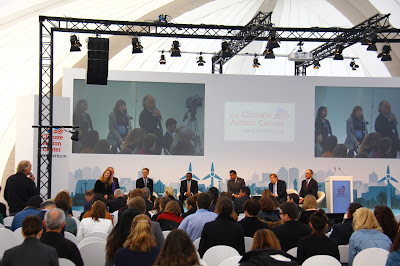COP 23 Wrap Up
Posted by: Anna McGinn
The Fijian presidency gaveled COP23 to a close just before 7am on Saturday, November 18 after a full night and early morning of negotiations. You can see the details of what happened over the course of the evening here.
The overall document coming out of COP23 is the Fiji Momentum for Implementation. Some of the major points of interest include:
 In addition to the decisions in the Fiji Momentum for Implementation, it is also important to note what ended up happening on some of the key negotiating streams which were carried out during this COP. It is very challenging to keep track of all the negotiations taking place, but my colleague from the University of Lancaster and I put together the following notes on the negotiations that we have been following to give you some sense of conclusions.
In addition to the decisions in the Fiji Momentum for Implementation, it is also important to note what ended up happening on some of the key negotiating streams which were carried out during this COP. It is very challenging to keep track of all the negotiations taking place, but my colleague from the University of Lancaster and I put together the following notes on the negotiations that we have been following to give you some sense of conclusions.
The overall document coming out of COP23 is the Fiji Momentum for Implementation. Some of the major points of interest include:
- A focus on preparing for COP24 which will take place next year at this time in Poland. It is clear that parties are working towards larger decisions that ought to happen at that time. They are even calling for an additional negotiating session between the usual May session and COP24 in order to be adequately prepared for COP24.
- The document launches the Talanoa Dialogue which will begin in 2018. It includes an informal note from the COP22 and COP23 presidency laying out the design of the dialogue.
- There is an emphasis, at least in terms of space dedicated in the document, on pre-2020 ambition. They have decided to have a stocktake on pre-2020 ambition at COP24 and at COP25.
 In addition to the decisions in the Fiji Momentum for Implementation, it is also important to note what ended up happening on some of the key negotiating streams which were carried out during this COP. It is very challenging to keep track of all the negotiations taking place, but my colleague from the University of Lancaster and I put together the following notes on the negotiations that we have been following to give you some sense of conclusions.
In addition to the decisions in the Fiji Momentum for Implementation, it is also important to note what ended up happening on some of the key negotiating streams which were carried out during this COP. It is very challenging to keep track of all the negotiations taking place, but my colleague from the University of Lancaster and I put together the following notes on the negotiations that we have been following to give you some sense of conclusions.
Loss and Damage: The main COP 23 agenda item focusing on loss and damage was the review of the report of the Executive Committee of the Warsaw International Mechanism for Loss and Damage Associated with Climate Change Impacts. There was much debate between parties as to whether loss and damage should become a permanent item on the negotiating agenda during future subsidiary body meetings, especially considering what some felt was an unclear mandate, and need, for the Executive Committee to continue its work after the initial 5-year work plan ends in 2020.
Looking at the COP23 decision regarding the Warsaw Mechanism, it looks as though the parties have tried to address this by making clearer the rolling of the Committee beyond these initial five years ending in 2020. This seems to be an alternative solution to making loss and damage a permanent item on future negotiating agendas.
Of course, the underlying tension below much of the loss and damage work and demands in negotiations is that countries see this mechanism as a tool for financing projects addressing loss and damage issues. This COP has done nothing in its official reports to move past the knowledge-gathering efforts of the previous two years and into looking at financial mechanisms attached to loss and damage.
You can find the advanced unedited version of the WIM decision here.
Agriculture: The working group on agriculture finally reached an agreement in the SBSTA/SBI joint task this COP, a decision 3 years in the making (over the course of five sessions). The decision calls on SBSTA and SBI to jointly address food security and agriculture, and specifically its vulnerability to climate change, through workshops and other means not really specified in the decision. The one-page decision then requests observers and parties to submit requests for topics for such meetings, listing 6 topics to begin with which include modalities for implementing the recommendations of the past 3 years' workshops, methods of assessing adaptation/adaptation co-benefits, and improved livestock management systems.
You can find the advanced unedited version of the decision here.
Indigenous Peoples: An outcome many parties were looking to by the end of this COP was the operationalization of the Local Communities and Indigenous Peoples Platform, mandated by the Paris Agreement to focus on knowledge, effective engagement, and climate actions/policies. The final decision accepted by the COP lays out in two pages the purpose of the Platform as understood by the Parties as well as a further explanation/illustration of the three general focuses of knowledge, engagement, and climate policies. Additionally, per the decision, the first activity of the Platform will be a multi-stakeholder workshop on the further operationalization of the Platform's three work areas. The decision still left questions that need to be answered before any full operationalization and so it has been referred to the SBSTA April-May session to be further discussed.
You can find the advanced unedited version of the decision here.
Adaptation Finance: Countries continued to negotiate on the role of the Adaptation Fund in serving the Paris Agreement throughout this COP. They did not decide that the Adaptation Fund "shall" serve the Paris Agreement, but there is agreement that it should serve the Paris Agreement. Shall adds legal weight to the assertion which some countries are not comfortable with as of yet. The conversation moved away from this language and towards the legality of how to transition the Fund. The parties decided that this transition should be the focus of the next negotiating session. Here is a link to the final informal note from the APA agenda item on the Adaptation Fund.
Ocean Pathway Partnership: Fiji along with many partner countries launched the Ocean Pathway Partnership on Thursday. This one page document states the importance in connecting oceans and climate change. It specifically calls out the interconnectedness of Sustainable Development Goals 13 (climate) and 14 (ocean). The document does not create any new agenda item or work program under the UNFCCC (which is what some parties had hoped for), but it does encourage integration of the ocean into future NDCs and into other negotiating streams. At the launch, Fiji announced that Sweden would be the co-chair of the Ocean Pathway Partnerships. Here is additional information about the Pathway although the final document is not posted yet.
To check out the decisions coming out of COP23, you can check out the UNFCCC website.
Thank you for following along during our time at COP23! Please reach out to us if you have any addition questions about the UNFCCC process.
Contributing Author: Keziah Groth-Tuft is a graduate student at the University of Lancaster in the UK studying climate change and human rights law. She has attended and conducted research at COP20 in Lima, Peru; COP21 in Paris, France; COP22 in Marrakech, Morocco; and here in Bonn at COP23.





Comments
Post a Comment